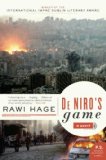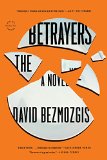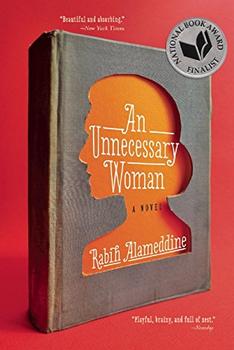Summary | Excerpt | Reviews | Beyond the book | Read-Alikes | Genres & Themes | Author Bio

Plucked from the slush pile of unsolicited manuscripts by Canadian publisher House of Anansi Press, and published in the US by Steerforth Press, De Niro's Game was a finalist for the 2006 Giller Prize and the Governor General's Award for Fiction, and the winner of the Paragraphe Hugh MacLennan Prize for Fiction and McAusland First Book Prize.
Ten thousand bombs had landed on Beirut, that crowded city, and I was lying on a blue sofa covered with white sheets to protect it from dust and dirty feet.
De Niro's Game started as a short story based on an incident Hage remembers as a child growing up in Beirut, when he witnessed other children playing Russian roulette with real guns after watching The Deer Hunter. His short story grew into a compact novel, the sort of length that many of us could happily consume in an evening given a couple of hours to ourselves, but to read De Niro's Game in one sitting will leave most readers emotionally, even physically, drained.
Ten thousand bombs had split the winds, and my mother was still in the kitchen smoking her long, white cigarettes.
De Niro's Game opens during one of the low points in The Lebanese Republic's 15-year civil war - the1982 Israeli siege of Beirut, in which over 10,000 lost their lives. Readers who are familiar with this period in Lebanon's history will recognize some of the events and pick up references to others, but those looking to understand the roots of the conflict will not find answers in De Niro's Game - this is not a book about why things happen but about what it's like to be inextricably caught up in them. Hage does not tell, he shows - offering a from-the-ground critique of the conflict that killed at least 100,000, only to lie semi-dormant for a further fifteen years before erupting again last year.
Ten thousand cigarettes had touched my lips, and a million sips of Turkish coffee had poured down my red throat.
It is a viciously intense, poetically raw story, interspersed with moments of dark humor, about two young men - Bassam, the narrator, and his friend since childhood, George - known as De Niro, for his habit of playing Russian roulette like Robert De Niro's character in The Deer Hunter. Beirut is their playground and their prison, violence a fact of life. Some of their friends and family are dead; some have joined the fighting; some have fled the country altogether; others, like George and Bassam (a nominal Christian but practicing atheist) roam the street as thugs - "aimless, beggars and thieves, horny Arabs with curly hair and open shirts and Marlboro packs rolled in our sleeves, dropouts, ruthless nihilists with guns, bad breath and long American jeans" - looking for ways to make money through whatever means necessary - because money, and the luck to stay alive long enough to spend it on either getting ahead or getting out, are all that matter.
Ten thousand bombs had fallen and I was waiting for death to come and scoop its daily share from a bowl of limbs and blood.
The first two-thirds of De Niro's Game are set in Beirut, the third in France, to which George eventually escapes, leaving behind the mourning mothers, destroyed neighborhoods, dead children, massacres of refugees, the fighting and the bombs - but if the reader expects a happy ending in the City of Love, forget it. You can take the boy out of Beirut but you can't take Beirut out of the boy, especially when the boy is an illegal immigrant in whom violence is ingrained, and who, unknown to himself, has walked into a situation as potentially dangerous as the one he left behind.
Ten thousand coffins had slipped underground and the living still danced above ground with firearms in their hands.
About the Author
Rawi Hage was born in Beirut and lived through nine years of the
Lebanese civil war in the Achrafieh district of Christian East
Beirut, the setting for De Niro's Game before emigrating to New York where he lived for several years. In 1992 he moved to Canada, where he has lived ever since. He is a
writer, visual artist, cab driver and curator. His writings have
appeared in Fuse, Mizna, Jouvert, The Toronto Review, Montreal
Serai, and Al-Jadid. His visual works have been shown in
galleries and museums around the world. He lives in Montreal.
He wrote De Niro's Game in English, his third language,
after Arabic and French.
"I grew up with Beirut divided. Through this novel I presented a secular element amidst all the sectarian chaos, as I think that Lebanon has maintained an understated, undermined secular element throughout the past 100 years, which is why I presented the main character in the novel as an atheist who doesn't believe in organized religion." - Rawi Hage.
![]() This review was originally published in The BookBrowse Review in October 2007, and has been updated for the
August 2008 edition.
Click here to go to this issue.
This review was originally published in The BookBrowse Review in October 2007, and has been updated for the
August 2008 edition.
Click here to go to this issue.

If you liked De Niro's Game, try these:

by David Bezmozgis
Published 2015
A compact saga of love, duty, family, and sacrifice from a rising star whose fiction is "self-assured, elegant, perceptive . . . and unflinchingly honest" (New York Times)

by Rabih Alameddine
Published 2014
From the author of the international bestseller The Hakawati comes an enchanting story of a book-loving, obsessive, seventy-two-year-old "unnecessary" woman with a past shaped by the Lebanese Civil War
To be ignorant of what occurred before you were born is to remain always a child
Click Here to find out who said this, as well as discovering other famous literary quotes!
Your guide toexceptional books
BookBrowse seeks out and recommends the best in contemporary fiction and nonfiction—books that not only engage and entertain but also deepen our understanding of ourselves and the world around us.